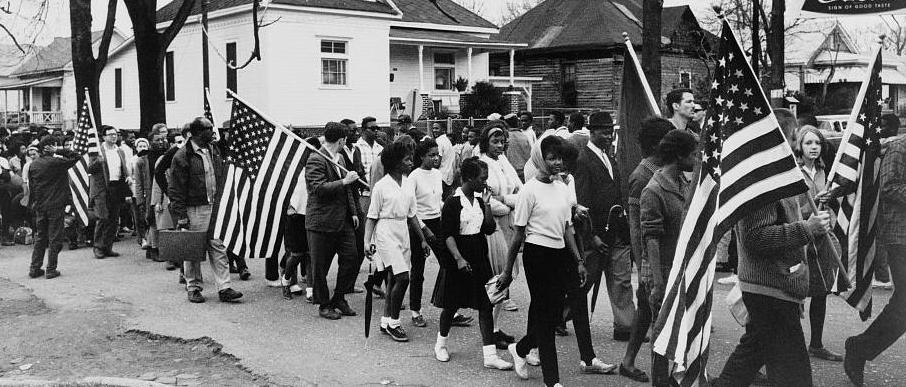by Jacalyn Barnes, Director of the Repentance Project
This is the question that resonated in my own heart as our country’s legacy of slavery and racism began to erupt in explosions of violence and terror. I turned to the Scriptures and wept.
From the Old Testament to the New, our Father’s deep compassion, His eternal love of justice, and His zealous defense of the oppressed pour out of the pages in surprising, heart-rending, and glorious ways. As many of my ancestors before me, I found solace, hope, and redemption in our Father’s words. He has called us as His children to do good, seek justice, rebuke the oppressor, defend the orphan, and plead for the widow (Isaiah 1:17). All the English translations of this verse use action words: do, seek, help, pursue, correct, reprove, defend, fight, plead.
Ours is not a passive faith.

Participants marching in the civil rights march from Selma to Montgomery, Alabama in 1965
Reverberating throughout the New Testament is a transformation mandate. We are to be utterly re-formed by the power of the Holy Spirit, becoming entirely new creations. As our minds are radically renewed, our thoughts, beliefs, passions, and actions are also recalibrated to our Father’s heart. We pick up the humility of Christ and, like Paul, we lay down our rights to things that are permissible but not profitable. We sacrifice wants, rights, and desires in the interest of our brothers and sisters, for the good of the Body, and because of our boundless love for our Father.
This call to sacrificial love is the foundation of our faith. We see it embedded in the New Testament from Christ’s sacrifice in the gospels, to the Pauline epistles that call us to esteem others over ourselves, to the Johannine text that entreats us to lay down our lives for others. This is what we signed up for: to die to self so that we may live in Christ. This reflects the revolutionary and self-giving love of our Father.
What does this have to do with racial unity? Everything.
The culture we live in promotes the individual over the collective, personal rights over self-sacrifice, pride over humility, possession over relinquishment, obtaining over surrendering. In this context, the instinctive response is to deny, blame, project, minimize, or rationalize. Consequently, as Christians, the act of repentance becomes inherently radical and countercultural. This is particularly true when we repent on behalf of our generations. Both Nehemiah and Daniel prayed, fasted, and wept as they confessed the sins of their ancestors (cf. Nehemiah 9:2, Daniel 9:8). Their prayers of repentance were corporate and generational. It was not only about their individual deeds, but also the generational legacy into which they were born. The repentance of Nehemiah and Daniel was a countercultural act of love and submission towards a holy and righteous God.
This is a helpful framework for understanding the Christian response to our nation’s legacy of slavery and discrimination. Even if our ancestors did not enslave others, even if our family members fought on behalf of the Union, even if our parents were immigrants, even if we treat others with kindness—we exist in a system that was built on genocide, slavery, oppression, violence, and terror. As Christians, we can lament this history and repent for the systems we have inherited.
Then we act.
As ambassadors of Christ on earth, kingdom action is our mandate. We are called to “Speak up, judge righteously, and defend the cause of the oppressed and needy” (Proverbs 3:19). At the Repentance Project, we encourage kingdom action through recognizing the enduring legacy of slavery, repenting with sorrow, and responding meaningfully in the context of relationships.
Action is a byproduct of true repentance. As Matthew reminds us and Luke reiterates, we must “Bear fruit in keeping with repentance” (Matthew 3:8, cf. Luke 3:8). Repentance isn’t a flaccid “I’m sorry.” It is the result of the same sin-shattering revelation that compelled the persecutor Saul to become the persecuted Paul. True repentance produces a radical shift in our hearts and minds that is evidenced in our words and actions. It allows us to willingly—and joyfully—relinquish power and privilege for the unity of the Body and on behalf of the oppressed and needy. Spirit inspired repentance bears fruit…and fruit that remains.
So dear friends, we invite you on this journey of kingdom action born out of an all-consuming, sacrificial love for our Father. As a first step, consider reading one of our devotionals and praying through these issues in community. You can also join The Corhaven Graveyard’s book club, attend one of their movie nights, or host your own. You might also consider signing up for our newsletter to learn of upcoming events and opportunities to get involved. Most importantly, sit with our Father and listen for His heart. He is faithful to guide each of us on this journey.
As we take these steps to recognize, repent, and respond in relationships, may all of our hearts beat with the Father’s heart for justice. Amen.
